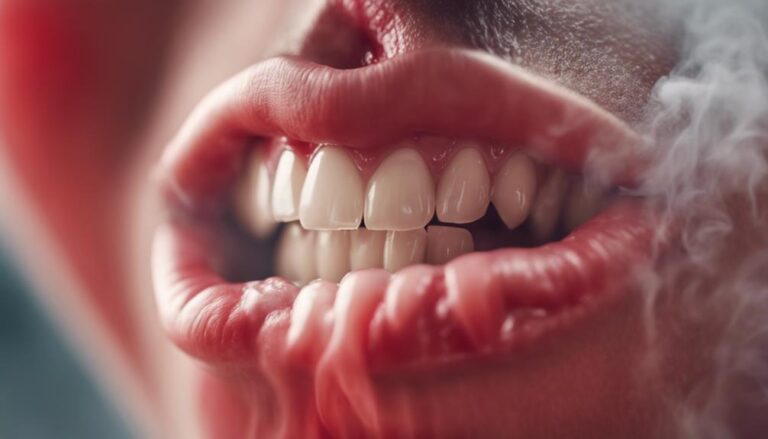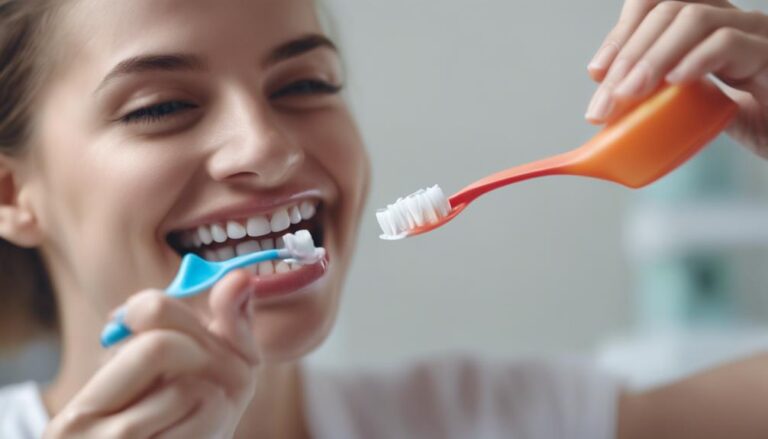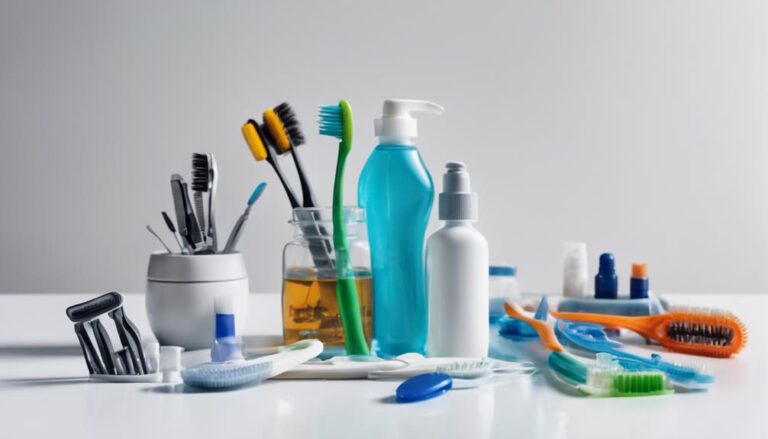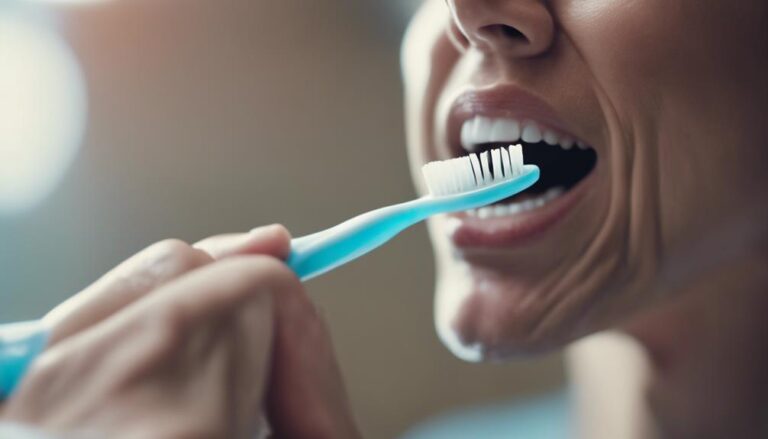Maintaining good oral hygiene is key. Brush teeth twice daily with a soft-bristled brush angled at 45 degrees. Floss every day in a ‘C’ shape around each tooth. Use mouthwash with essential oils to complement brushing and flossing. Get regular dental check-ups for early issue detection. A balanced diet contributes to oral health too. Avoid tobacco products for fresher breath. These strategies work wonders for preventing bad breath and gum disease.
Key Takeaways
- Brush teeth twice daily with a soft-bristled toothbrush and fluoride toothpaste.
- Floss daily to remove food particles and plaque between teeth.
- Use mouthwash with fluoride and antimicrobial agents to kill bacteria.
- Maintain regular dental check-ups for early detection and professional cleanings.
- Consider using interdental brushes or water flossers for a thorough clean.
Importance of Oral Hygiene
Maintaining proper oral hygiene is essential for preventing bad breath and gum disease. Proper brushing is a cornerstone of oral health maintenance. Brushing your teeth at least twice a day removes plaque, a sticky film of bacteria that forms on teeth. When plaque isn’t removed, it can harden into tartar, leading to gum inflammation and potential gum disease. Using a soft-bristled toothbrush and fluoride toothpaste is recommended by dental professionals to effectively clean teeth without damaging the enamel.
In addition to brushing, flossing daily is vital for reaching areas between teeth that a toothbrush can’t access. Flossing helps remove food particles and plaque buildup, further reducing the risk of bad breath and gum disease. Mouthwash can also be a helpful addition to your oral hygiene routine, as it can reach areas not easily accessible by brushing and flossing alone.
Regular dental check-ups are essential for maintaining good oral health, as dentists can detect early signs of gum disease and provide professional cleanings to complement your at-home oral hygiene efforts.
Brushing Techniques for Clean Teeth
Implementing proper brushing techniques is vital for achieving clean and healthy teeth. To guarantee ideal oral hygiene, it’s important to use the correct method when brushing your teeth. Start by selecting a soft-bristled toothbrush that can reach all areas of your mouth easily. Hold the toothbrush at a 45-degree angle towards the gum line and use gentle, circular motions to clean the front, back, and top surfaces of each tooth. Pay special attention to the gum line, where plaque tends to accumulate.
Brushing should last for a minimum of two minutes to effectively remove food particles and plaque. Remember to brush your tongue gently to eliminate bacteria that can cause bad breath. Replace your toothbrush every three to four months or sooner if the bristles appear frayed. Additionally, consider using supplementary tools such as interdental brushes or water flossers for a more thorough clean.
Flossing for Healthy Gums
To guarantee thorough oral cleanliness and gum health, incorporating flossing into your daily dental routine is essential. Proper technique is necessary for effective flossing.
Start by taking about 18 inches of floss and winding most of it around your middle fingers, leaving about 1-2 inches to work with. Hold the floss tightly between your thumbs and forefingers, gently guiding it between each tooth in a gentle back-and-forth motion. Be sure to curve the floss against the tooth to form a ‘C’ shape and carefully slide it under the gumline. Repeat this process for each tooth, using a clean section of floss every time.
Flossing should be done at least once a day to remove food particles and plaque that your toothbrush may not reach. By making flossing a daily routine, you can maintain healthy gums and prevent gum disease. Remember, consistency is key to achieving excellent oral health.
Mouthwash and Its Benefits
Using a quality mouthwash as part of your daily oral care routine can provide numerous benefits for your dental health and overall freshness. While there are some myths surrounding mouthwash, the benefits are clear. Mouthwash can help kill bacteria that cause bad breath, prevent gum disease, reduce plaque buildup, and promote healthier gums.
When choosing the right mouthwash, look for one that contains fluoride to strengthen enamel, antimicrobial agents like chlorhexidine for fighting bacteria, and essential oils such as eucalyptol, menthol, thymol, or methyl salicylate for fresh breath. Alcohol-free options are also available for those with sensitivity.
It’s important to note that mouthwash should complement, not replace, your regular oral hygiene routine of brushing and flossing. Incorporating mouthwash into your daily regimen can enhance your overall oral health and leave you with a clean, fresh feeling that lasts throughout the day.
Regular Dental Check-ups
Regular dental check-ups are crucial for maintaining oral health and preventing issues like gum disease and bad breath. These visits help detect problems early and ensure a healthy smile. Professional cleanings during check-ups remove plaque and tartar, reducing the risk of cavities and gum disease. Key reasons for regular check-ups include early detection of dental issues, gum disease prevention, professional cleanings for oral health, and personalized oral hygiene advice.
Balanced Diet for Oral Health
Maintaining a balanced diet is essential for excellent oral health. Nutritional habits and dietary choices play a significant role in preventing bad breath and gum disease. A diet rich in vitamins, minerals, and antioxidants can help support overall oral health by reducing inflammation, strengthening gums, and preventing bacterial growth. Here is a table highlighting some key nutrients beneficial for oral health:
| Nutrient | Source |
|---|---|
| Vitamin C | Citrus fruits, peppers |
| Calcium | Dairy products, almonds |
| Vitamin D | Fatty fish, egg yolks |
| Antioxidants | Berries, nuts, and seeds |
Including these nutrients in your daily meals can promote healthy teeth and gums. Additionally, staying hydrated by drinking water throughout the day helps to wash away food particles and reduce the risk of cavities. Making mindful choices about what you eat not only benefits your overall health but also contributes to a confident smile and fresh breath.
Habits to Avoid Bad Breath
To combat bad breath effectively, it’s important to eliminate habits that contribute to oral odor. Here are some key habits to avoid bad breath:
- Stay Hydrated: Drinking an adequate amount of water helps in maintaining saliva production, which is essential for washing away bacteria and food particles that can cause bad breath.
- Avoid Excessive Coffee and Alcohol: These beverages can contribute to dry mouth, leading to bad breath. Moderation is key.
- Practice Stress Management: Stress can lead to dry mouth and other oral health issues. Finding healthy ways to manage stress, such as exercise or meditation, can help prevent bad breath.
- Quit Smoking: Smoking not only causes bad breath but also increases the risk of gum disease and other oral health problems.
Incorporating these habits into your daily routine can greatly reduce the chances of experiencing bad breath and contribute to overall oral health.
Frequently Asked Questions
Can Stress and Anxiety Contribute to Bad Breath?
When stress factors increase, my oral health can suffer. High anxiety levels can contribute to halitosis. Managing stress and anxiety is crucial to maintain good oral hygiene and prevent bad breath.
Is There a Connection Between Oral Health and Heart Disease?
In the field of health, one cannot overlook the profound link between oral health and heart disease. The correlation is clear: maintaining excellent dental hygiene directly impacts our cardiovascular health, underscoring the importance of thorough self-care.
How Does Smoking Impact Bad Breath and Gum Disease?
Smoking greatly impacts oral health, worsening bad breath and increasing the risk of gum disease. Maintaining good oral hygiene habits, like brushing and flossing regularly, can help mitigate these effects and improve overall dental health.
Can Certain Medications Cause Dry Mouth and Bad Breath?
Managing dry mouth symptoms effectively is crucial to prevent bad breath caused by certain medications. Staying hydrated and maintaining good oral hygiene are key. If medication effects persist, seek advice from a healthcare provider. Based on personal experience, I have learned the significance of addressing dry mouth symptoms promptly.
Are There Natural Remedies to Prevent Bad Breath and Gum Disease?
In the garden of oral health, herbal remedies bloom like fragrant flowers warding off bad breath and gum disease. Alongside, dietary changes act as nourishing soil, cultivating a healthy smile from within.
Conclusion
In summary, maintaining good oral hygiene is essential in preventing bad breath and gum disease. Did you know that 47.2% of adults over the age of 30 have some form of gum disease?
By following the strategies mentioned in this article, such as proper brushing techniques, regular dental check-ups, and a balanced diet, you can greatly reduce your risk of developing these oral health issues.
Remember, a healthy smile is a happy smile!






